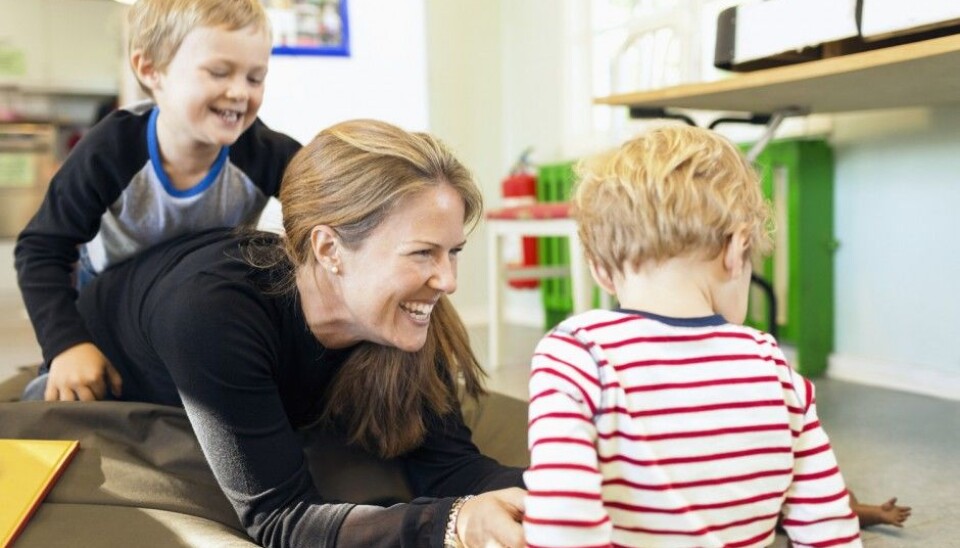
Here’s what kids really think of their preschool teachers
A Danish researcher asked children to say what they think about the adults who care for them.
A kind, fun adult is someone who plays tag with you and pushes you on a swing. That’s what children themselves said when asked to describe the preschool employees they like.
Here’s what they have to say, however, about employees that they don’t like so very much:
“One teacher was named Karin, she was very grumpy and strict. She was so strict. Her face would get really red, and then she would explode.”
Anette Boye Koch is a Danish researcher who interviewed eleven six-year-olds about their views of preschool staff.
The children themselves describe most adults as kind or strict. Koch has used their descriptions as a basis to categorize staff into four types:
- The Nurturer: Offers praise and encouragement. The kind of person who will let you climb onto their lap if you are feeling a little sad. “Birthe, she is a little old, and she is good at making you feel better.”
- The Playmate: Laughs and jokes. Plays with the kids on their terms. “Jessy, she is so funny. Sometimes when we play with Legos, she begins to tickle us.”
- The Mentor: Creative and goal-oriented. Organizes activities that kids can learn from. “The adults, they help us. They play with us and see what we know.”
- The Controller: Ensures peace and order. Also resolves conflicts between children. “The couch is not for jumping on, you should just sit on it.” “The adults are grumpy so often, I think it’s no fun.”
Adults choose roles
Koch equipped kids with cameras and sent them into the preschool they had recently graduated from. The children were told to take pictures of places where they had shared activities with adults.
The photographs they took were the basis for a conversation about the adults in the preschool. This is a common technique when conducting research with children, who may find it easier to talk about issues based on specific experiences or events.
Other researchers have categorized preschool employees much as Koch did, although the characterizations have varied slightly. And employees themselves can even switch between different roles, but generally prefer some roles more than others.
“I think that it is important for children to have all these different types of employees at their preschool,” says Monica Seland. She is an associate professor at the Queen Maud University College of Early Childhood Education in Trondheim.
Employees in a hurry
Seland has also studied children in preschool, although her focus was what it takes for 4-6 year olds to thrive in this environment.
“Some of the common recurring issues that children perceive as negative are that they have a hard time getting an adult’s attention, that the adults are often rushed, and that they scold or yell,” she said.
Over half of the approximately 170 children from Sør-Trøndelag County who were polled in the study “Children's well-being and participation in preschool”, reported that they were unable to make contact with an adult when they needed to. Most said that adults yelled at and scolded children. Around half reported that their experience of preschool was just so-so or not so nice.
Justice good, yelling bad
The Danish study shows that children like it when a teacher comes to intervene in unfair or problematic situations. Think about it: how would you feel if another child bit you and there were no adults to tell that child that biting is not okay?
That does not mean that adults should scold children, Seland said.
“No child likes to be yelled at, whether they’re the one being scolded or someone else is getting yelled at,” she said. “But when an adult comes to help children sort things out and talk to them about what has happened, that is important.”
Koch’s doctoral research showed that educators have little impact on whether or not children have fun in preschool. She asked children to take pictures of what makes them happy. Their teachers were very rarely in these pictures. The staff did not even know what play places were important to children.
Nevertheless, Seland says, the staff are still important for child welfare because they can make sure that the children feel safe.
“Adults are essential in creating a basic sense of safety,” Seland said. “We have found that children who answer that adults are not readily available to them actually do worse in preschool than those who have adults available.”
Reference:
Anette Boye Koch: Pædagogens rolle og betydning for trivsel i børnehaven - Børneinformerede perspektiver på professionelle voksne [The educator's role and importance for wellbeing in preschool - Child perspectives on professional adults]. Nordic Studies in Education nr. 3, 2016, vol. 35. DOI: 10.18261/issn.1891-5949-2016-03-02. Abstract.
--------------------------------------






























